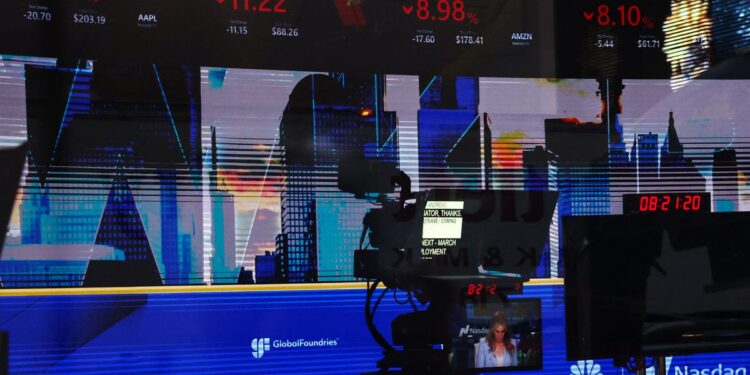Trump’s tariff pause brings little relief as recession fears linger
Donald Trump’s move to postpone most of his new tariffs for 90 days seems to have brought only fleeting relief for markets. After a huge rally on April 10, April 11 saw Asian stocks head lower again.
When the stock market goes haywire, the natural impulse might be to panic and sell.
In early April, the stock market actually did go haywire. For analysts at Vanguard, the investment firm, the roller-coaster ride provided a timely opportunity to study how investors behave when the going gets tough.
As it turns out, most investors passed the test.
Vanguard tracked the behavior of its “self-directed” clients, the ones who make their own decisions about moving money in and out of the market, between April 3 and 9. Here’s what their analysis found:
- Only 8.4% of investors executed trades on any of those days, reacting to the volatile market by buying or selling stocks.
- Most investors who made trades did so on only one of the five trading days.
- Of the investors who made trades, buyers outnumbered sellers nearly 5 to 1. In other words, few investors resorted to panic-selling.
“The headline is, the vast majority of our self-directed investors stayed the course,” said James Martielli, head of investment and trading services at Vanguard.
To Martielli, the data shows everyday investors rode out a turbulent stock market in relative calm, following the cardinal rules of investing: Buy stocks when prices are low, and sell when they’re high. Don’t make impulsive moves. Stick to the plan.
“The good news is, we did not see a lot of folks across our very wide investor base ‘sell out,’” he said.
In a turbulent market, it’s hard not to panic
There was plenty reason to panic in the early days of April. To recap:
- On Wednesday, April 2, President Trump announced sweeping tariffs on all countries.
- In response, on April 3, the Dow Jones Industrial Average shed nearly 1,700 points. The S&P 500 and Nasdaq had their worst day since 2020.
- On Friday, April 4, China announced retaliatory tariffs. The Dow lost another 2,200 points. The Nasdaq descended into a bear market.
- On Monday, April 7, Trump doubled down on tariffs. Stocks closed mostly lower. The market slid further on April 8.
- On Wednesday, April 9, Trump paused most of his tariff campaign, partly in response to reeling markets. Traders exhaled, and all three major stock indices marked huge gains.
Lots of trading, but not much panic-buying
On April 3, the first day of big market losses, the investment firm Schwab logged a busy day of trading. But most investors did not panic-sell.
“We saw more self-directed investors be proactive, rather than reactive,” said Patrick Means, vice president and branch manager at a Schwab branch in Dallas.
On the whole, Schwab investors did more buying than selling in the week of April 3, said Alex Coffey, senior trading and derivatives strategist.
Nvidia was the most-bought stock, he said, followed by Amazon, Apple and Tesla. Many investors purchased shares in indexed exchange-traded funds, or ETFs, “perhaps as a volatility-driven alternative to investing in individual stocks,” which can be riskier, Coffey said.
BlackRock, too, found that investors mostly stayed calm during the turbulence of early April. The investment firm hosted virtual events to guide clients through the market chaos.
“Overwhelmingly, the questions were more along the lines of ‘What should I buy?’ rather than ‘What should I sell?’” said Kristy Akullian, head of iShares investment strategy, Americas, at BlackRock. “It did feel as though investors were looking for buying opportunities more than they were panicking and selling.”
We asked the experts to tell us what they have been telling jittery investors over the past two weeks. Here, then, are a few rules to remember when markets are reeling:
Don’t try to time the market
It might sound tempting to cash out of the stock market when the indexes are falling, sit out the downturn, and reinvest when markets hit bottom.
The big problem with that strategy, experts say, is picking the right moment to cash out and cash in.
“So often, some of the absolute worst days in the market are in close proximity to some of the absolute best days in the market,” Akullian said. Case in point: April 9, when stocks rose dramatically after several days of losses.
“The benefit of staying invested is, you’re going to be in the market on the days when there are the biggest gains,” Means said.
That leads to our second tip:
Stick to the plan
Stocks rise and fall, sometimes dramatically. For long-term investors, experts say, the best strategy is usually to sit back and let the drama play out.
Bear markets are usually shorter than bull markets, Schwab notes. Since 1966, the average bear market has lasted about 15 months, while the average bull market has endured for nearly six years.
Following an investment plan over the long term takes discipline, and it’s one of Vanguard’s Principles for Investing Success. (The others: create clear, appropriate investment goals; maintain a balanced and diversified mix of investments; and minimize costs.)
“You can’t control the markets. You don’t know what they’re going to do,” said Martielli of Vanguard. “You can control yourself, by not making emotional decisions.”
Consider buying stocks at a discount
While financial experts don’t like to see investors make impulsive trades, the turbulence of early April did create opportunities for anyone looking to buy stocks on sale.
If you’re leery about the volatility of individual stocks, one alternative is to purchase broad index funds, which are generally less risky.
Another option is to look “for stocks that are not quite as sensitive to swings,” said Akullian of BlackRock.
Some mutual funds and ETFs are tailored to minimize volatility, with a portfolio that is more predictable than the market as a whole. BlackRock offers an explainer sheet on “minimum-volatility” investing.














